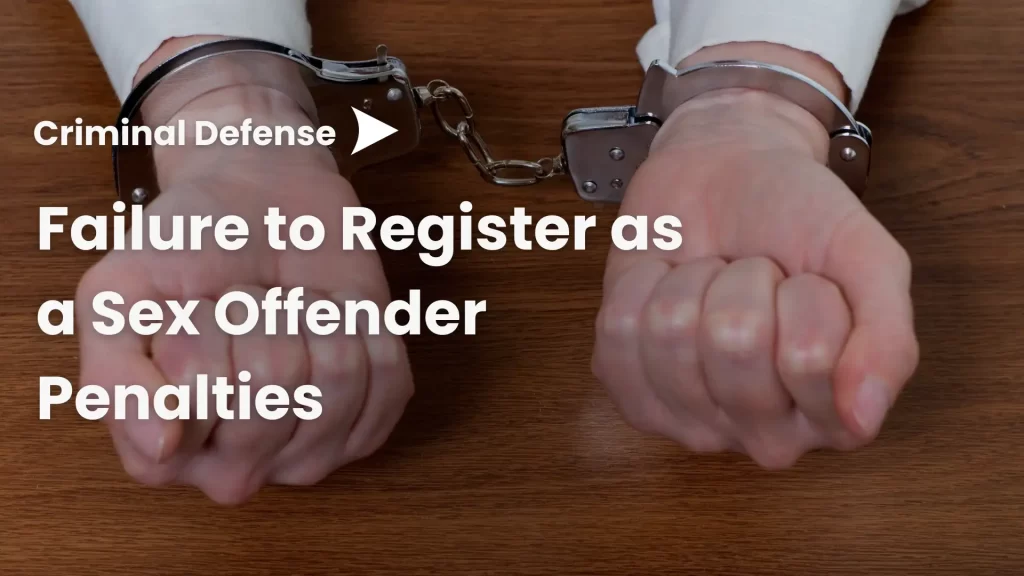Posted on Monday, June 10th, 2024 at 9:00 am

Have prosecutors charged you with failure to register as a sex offender after a sex offense conviction? Ohio’s penalties for failure to register as a sex offender can have a drastic, negative impact on your life.
If you’re facing a failure to register a charge, Moermond & Mulligan, LLC’s experienced Cincinnati criminal defense lawyers can explain your legal options and help you fight the charges.
What Does Failure to Register Mean?
Failure to register is when someone who pled guilty or was convicted of a sex offense fails to register for Ohio’s sex offender registry. You are required to to register as Ohio has strict laws when it comes to sex offense registration that applies to both residents and visitors of the state.
How Long do Sex Offenders Have to Register in Ohio?
According to Section 2950.04 of the Ohio Revised Code (ORC), sex offenders must register in person with the sheriff. Registration must be done within three days of release from imprisonment or entering a county to live, work, or attend school. You must adhere to this code even if your conviction happened in another state.
When registering, you must provide the following:
- Your name
- Your social security number and date of birth
- Your home address
- Your employer and the address where you work
- Your school and its address
- Your license plate number
- Any professional licenses you have
- Your email addresses, phone numbers, and online usernames
Additionally, sex offenders must regularly re-register. And they must update their registration any time their information changes, such as a change of address. ORC Section 2950.06 sets the amount of time between re-registrations depending on the tier of your initial sex offense conviction:
- Tier 1 offenders must register with the sheriff each year on the anniversary of their initial registration date.
- Tier 2 offenders must register with the sheriff every 180 days after their initial registration date.
- Tier 3 offenders must register with the sheriff every 90 days after their initial registration.
Is Failure to Register as a Sex Offender a Felony?
Failing to comply and register as a sex offender is a felony offense. The degree of the felony corresponds to the severity of the original sex offense crime that led to your conviction or guilty plea. This new felony will be the same degree or higher than the initial crime.
ORC Section 2950.99 outlines the penalties this way:
- Failure to register after a first-degree felony conviction is a first-degree felony.
- Failure to register after a second-degree felony conviction is a second-degree felony.
- Failure to register after a third-degree felony conviction is a third-degree felony.
- Failure to register after a fourth-degree felony conviction is a fourth-degree felony.
- Failure to register after a fifth-degree felony conviction is a fourth-degree felony.
- Failure to register after a misdemeanor conviction is a fourth-degree felony.
If you have multiple sex offense convictions, the highest degree of conviction will apply when calculating the felony degree for failing to register.
What Is the Sentence for Failure to Register?
The sentence you could receive for failure to register depends on two things. First is the degree of the felony the courts are charging you with. Second is the nature of your original sex offense. ORC Sections 2929.14 and 2929.144 outline the possible prison terms you could receive:
- The minimum penalty for a first-degree felony is three to eleven years in prison. The maximum is the minimum penalty multiplied by 1.5.
- The minimum penalty for a second-degree felony is two to eight years in prison. The maximum is the minimum penalty multiplied by 1.5.
- The penalty for a third-degree felony is a definite term of between nine months and five years in prison.
- The penalty for a fourth-degree felony is a definite term of between six and eighteen months in prison.
Defenses for Failure to Register as a Sex Offender
There are a few defenses against failure to register as a sex offender that a criminal defense attorney can help you explore. Not all these defenses will result in prosecutors tossing the charge out. However, they may agree to a plea bargain that reduces the degree of the offense. Some defenses are:
- “You did not receive information about your obligation to register after your release from prison.”
- An administrative error on the part of authorities resulted in your registration failing
- You were unable to comply with your duty to register, such as if you were hospitalized
- You attempted to comply with your duty to register, but unforeseen circumstances prevented you from doing so
- You were incorrectly classified as a higher-tier offender than you should have been
Can You Get Off the Sex Offender Registry in Ohio?
 Depending on the sex offender tier you fall under, you may be eligible for removal from Ohio’s sex offender registry. ORC Section 2950.07 states that:
Depending on the sex offender tier you fall under, you may be eligible for removal from Ohio’s sex offender registry. ORC Section 2950.07 states that:
- Tier 1 sex offenders must continue to register for 15 years.
- Tier 2 sex offenders must continue to register for 25 years.
- Tier 3 sex offenders must continue to register for life.
Additionally, ORC Section 2950.15 gives tier 1 offenders an alternative option. After ten years, tier 1 offenders may file a motion to terminate their registration duty. The motion should include the following:
- A certified copy of the judgment entry
- Documentation of the date of discharge
- Evidence that you completed a certified sex offender treatment program
- They did not inform you of your duty to register upon your release from imprisonment.
- Evidence that you have paid financial sanctions
Cincinnati Sex Crime Defense Attorney
If you have been charged with failure to register as a sex offender in Ohio, call Moermond & Mulligan, LLC at (513) 421-9790 or contact us online to schedule a free consultation. The Cincinnati sex crime defense attorney of Moermond & Mulligan, LLC can explain the charges you’re facing and fight them on your behalf. Our attorneys have over 50 years of combined experience defending clients in Cincinnati and the surrounding areas. You can trust us to help you with your case.
Related Posts:
Written By: Moermond & Mulligan, LLC
Last Updated: 02-11-2025